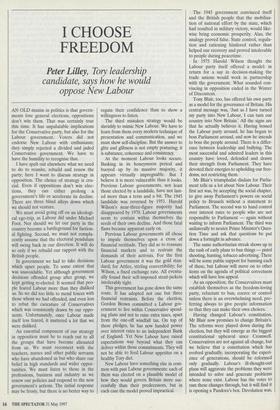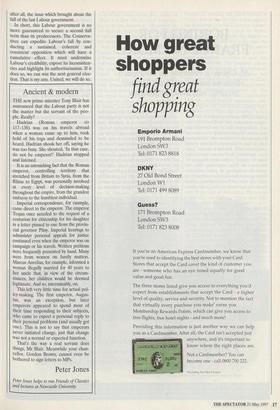I CHOOSE FREEDOM
Peter Lilley, Tory leadership
candidate, says how he would oppose New Labour
AN OLD maxim in politics is that govern- ments lose general elections, oppositions don't win them. That was certainly true this time. It has unpalatable implications for the Conservative party, but also for the Labour government. Voters did not endorse New Labour with enthusiasm; they simply rejected a divided and jaded Conservative government. We have to have the humility to recognise that.
I have spelt out elsewhere what we need to do to reunite, rebuild and renew the party; here I want to discuss strategy in opposition. The choice of strategy is cru- cial. Even if oppositions don't win elec- tions, they can either prolong a government's life or accelerate its decline. There are three blind alleys down which we should not venture.
We must avoid going off on an ideologi- cal ego-trip, as Labour did under Michael Foot. Nor should we let our party in the country become a battleground for faction- al fighting. Second, we must not compla- cently assume that the electoral pendulum will swing back in our direction. It will do so only if we rebuild our rapport with the British people.
In government we had to take decisions which upset people. To some extent that was unavoidable. Yet although government decisions offended group after group, we kept getting re-elected. It seemed that peo- ple feared Labour more than they disliked us. So we did too little to mend fences with those whom we had offended, and even less to rebut the caricature of Conservatives which was consistently drawn by our oppo- nents. Unfortunately, once Labour made itself less feared, it mattered a lot that we were disliked.
An essential component of our strategy in opposition must be to reach out to all the groups that have become alienated from us. We must reconnect with the teachers, nurses and other public servants who have abandoned us but who share our belief in high standards and wider oppor- tunities. We must listen to those in the professions, business and industry as we renew our policies and respond to the new government's actions. The initial response may be frosty, but there is no better way to regain their confidence than to show a willingness to listen.
The third mistaken strategy would be slavishly to mimic New Labour. We have to learn from them every modern technique of presentation and communication, and we must show self-discipline. But the answer to glitz and glibness is not empty posturing; it is substance, coherence and consistency.
At the moment Labour looks secure. Basking in its honeymoon period and buoyed up by its massive majority, it appears virtually impregnable. But I believe it is more vulnerable than it looks. Previous Labour governments, not least those elected by a landslide, have not last- ed more than a term and a bit. The 1945 landslide was reversed by 1951. Harold Wilson's near-three-figure majority had disappeared by 1970. Labour governments seem to contain within themselves the seeds of their own decline. And those fatal flaws became apparent early on.
Previous Labour governments all chose to impale themselves upon a cross of financial rectitude. They did so to reassure financial markets and to restrain the demands of their activists. For the first Labour government it was the gold stan- dard; for Attlee, stirling convertibility; for Wilson, a fixed exchange rate. All eventu- ally found their self-imposed strait-jackets intolerably tight.
This government has gone down the same route. It has adopted not one but three financial restraints. Before the election, Gordon Brown committed a Labour gov- ernment to live within Conservative spend- ing plans and not to raise extra taxes, apart from the one-off windfall tax. On top of these pledges, he has now handed power over interest rates to an independent Bank of England. Yet New Labour have raised expectations way beyond what they can deliver within those commitments. They will not be able to feed Labour appetites on a healthy Tory diet.
New Labour have something else in com- mon with past Labour governments: each of them was elected on a plausible model of how they would govern Britain more suc- cessfully than their predecessors, but in each case the model proved impractical. The 1945 government convinced itself and the British people that the mobilisa- tion of national effort by the state, which had resulted in military victory, would like- wise bring economic prosperity. Alas, the analogy proved false. State control, regula- tion and rationing hindered rather than helped our recovery and proved intolerable to people during peacetime.
In 1975 Harold Wilson thought the Labour party itself offered a model: in return for a say in decision-making the trade unions would work in partnership with the government. What sounded con- vincing in opposition ended in the Winter of Discontent.
Tony Blair, too, has offered his own party as a model for the governance of Britain. His central message was, 'Just as I have turned my party into New Labour, I can turn our country into New Britain.' All the signs are that he actually believes it. Having bossed the Labour party around, he has begun to boss Parliament around, and now he intends to boss the people around. There is a differ- ence between leadership and bullying. The most successful and admired leaders in this country have loved, defended and drawn their strength from Parliament. They have devoted their energies to upholding our free- doms, not restricting them.
Mr Blair's triumphalist disdain for Parlia- ment tells us a lot about New Labour. Their first act was, by accepting the social chapter, to give away Parliament's powers on social policy to Brussels without a statement to Parliament. The second was to hand control over interest rates to people who are not responsible to Parliament — again without waiting to inform Parliament. The third was unilaterally to neuter Prime Minister's Ques- tion Time and ask that questions be put down a fortnight in advance.
The same authoritarian streak shows up in the rush of early plans to ban things — pistol shooting, hunting, tobacco advertising. There will be some public support for banning each of these, but Labour will move on to other items on the agenda of political correctness which will have less appeal.
As an opposition, the Conservatives must establish themselves as the freedom-loving party, reluctant to ban, coerce or control unless there is an overwhelming need, pre- ferring always to give people information so that they can make their own choices.
Having changed Labour's constitution, Mr Blair now promises to change Britain's. The reforms were played down during the election, but they will emerge as the biggest constitutional upheaval since Cromwell. Conservatives are not against all change, but we believe that a constitution which has evolved gradually, incorporating the experi- ence of generations, should be reformed only gradually. Labour's ill-thought-out plans will aggravate the problems they were intended to solve and generate problems where none exist. Labour has the votes to ram these changes through, but it will find it is opening a Pandora's box. Devolution was, after all, the issue which brought about the fall of the last Labour government.
In short, this Labour government is no more guaranteed to secure a second full term than its predecessors. The Conserva- tives can expedite Labour's fall by con- ducting a sustained, coherent and consistent opposition which will have a cumulative effect. It must undermine Labour's credibility, expose its inconsisten- cies and highlight its authoritarianism. If it does so, we can win the next general elec- tion. That is my aim. United, we will do so.



































































 Previous page
Previous page